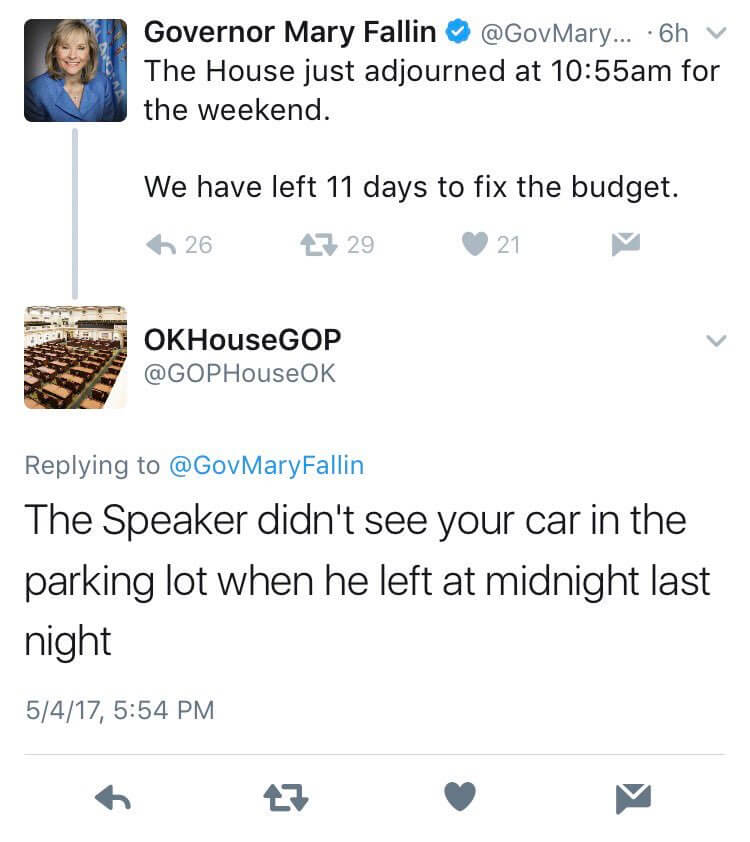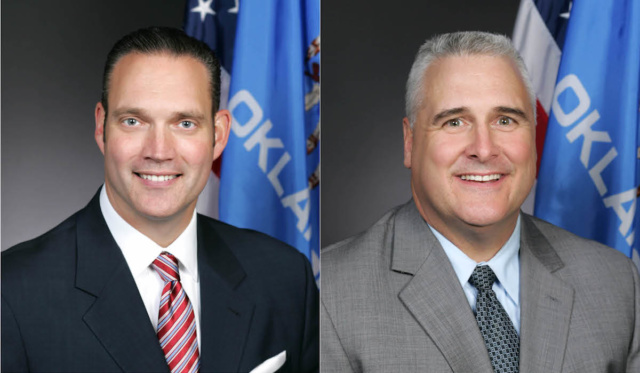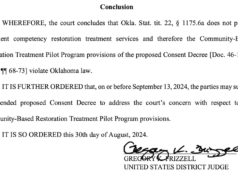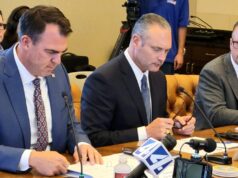
Two weeks ago, we published an editorial critiquing “useless acrimony” about Oklahoma state budget discussions. In it, GOP legislative leaders were noted for working hard to strike a budget agreement.
While those same leaders are still putting in work, results remain scant.
To that end, the fact House Speaker Charles McCall (R-Atoka) and Senate President Pro Tempore Mike Schulz (R-Altus) have mostly avoided public ridicule for the budget stalemate seems odd.
If Oklahomans want an idea of where McCall and Schulz might be coming up short, the first place to look might be at votes … or the lack thereof.
In the House, a major revenue package was pulled from consideration last week after House Minority Leader Scott Inman (D-Del City) signaled his caucus’ 26 votes would not support a cigarette tax without a corresponding tweak of gross production taxes on oil and gas wells. He also opposes that measure’s included fuel tax.
While GOP leaders likely had enough “yes” votes to pass the bill if Inman led his caucus on board, word spread that Republican members were pulling off the bill as well.
GPT the key to unlock a grand bargain?
The requirement that new taxes receive three-fourths support in both chambers — or be placed on a statewide ballot for voter approval — has handed Inman substantial leverage in this year’s budget negotiations. The gubernatorial candidate has staked a lot of his political capital on a call for gross production tax changes.
But since the oil and gas industry holds such clout, only one Republican in leadership has openly tried to turn that key to unlock a grand bargain, even as the industry itself seeks final language for and passage of SB 284, which would expand lateral drilling opportunities in Oklahoma.
The revenue conundrum has left a lot of people with a lot of questions.
How many GOP votes might exist for a GPT change? Since tweaking a tax exemption would require only 51 House votes, who has made the call to keep it off the table? Does McCall not want to anger industry leaders in case rumors he wants to run for Congress prove true? Would Schulz refuse to hear a GPT change anyway in the Senate? How many senators are open to it? Would the governor sign such a bill? And what level of GPT change would it ultimately take for Inman to bring his votes to the table on the cigarette tax?
Depending who you ask, what day it is and whether you believe politicians when they look you in the eye and say something, the answers to those big questions are all over the place.
GOP House members will point fingers at Schulz. GOP senators claim it’s McCall who is wussing out. For different reasons, many people are frustrated by Inman and the anti-tax Oklahoma Council of Public Affairs, respectively. Enraged Facebookers blame Gov. Mary Fallin for most everything. Fallin just wants to see votes on the board.
And that’s where criticism of McCall and Schulz could start. With two weeks left to raise revenue that would help balance an $878 million budget hole, no floor votes have occurred on substantial revenue-raising measures (which currently rules say must originate in the House).
As a result, McCall and his leadership team looked inevitably foolish declaring a Wednesday vote but ultimately delaying the cigarette tax, fuel tax and oil-and-gas subsidy rollback bill, colloquially called the Turducken. He looked even more foolish by telling reporters he would talk to them that afternoon before changing his mind.
His media team tripled-down on that foolishness by taking pot shots at Fallin the next day on Twitter:

The governor lives literally across the street from the State Capitol, and she does not have to park her own car.
Schulz opposes GPT, but might still hear it?
On the Senate side, Schulz held press availability Thursday where he was asked multiple questions about gross production tax changes.
While he personally opposes it, Schulz said if a GPT measure made its way off the House floor, it would first have to pass through a Senate Joint Committee on Appropriations and Budget, meaning it would have proven support from his caucus (audio below).
Reading between the lines, his phrasing could leave the door open to hearing GPT if the House uses it as a way to bring Democrats on board for the Turducken. On the other hand, Schulz said the cigarette tax appears stalled, so perhaps he envisions no grand bargain on “revenue raisers.”
Either way, he remains “100 percent” confident that a budget will be completed and a special session will be avoided, even if it means state agencies need to prepare for the worst case scenario: 18 percent cuts.
While Schulz can be lauded for being more forthcoming with media and the public than McCall, the pair will share public anger over legislative dysfunction until stakeholders learn to compromise for the good of the state.
After all, that’s why the Speaker and the Pro Temp get the good parking spaces, even at midnight.





















